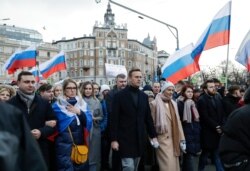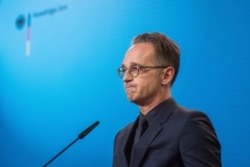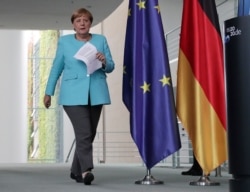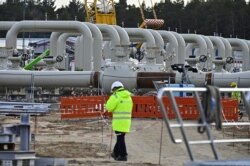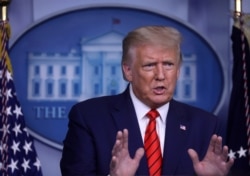Leading German politicians are calling on the country’s Chancellor, Angela Merkel, to abandon the multi-billion-dollar natural gas pipeline known as Nord Stream 2, linking Russia with Germany, because of the poisoning of Russian opposition activist Alexei Navalny.
They say Germany can’t be indifferent to the attempted assassination and stopping Nord Stream 2 would send a clear message to the Kremlin that enough is enough.
Moscow has shrugged off allegations that Russian authorities were behind what Berlin and other Western governments say was the attempted murder of Navalny, who is in an induced coma and undergoing treatment at the Charité University Hospital in Berlin.
Germany's foreign minister warned Moscow last week that the joint underwater gas pipeline project will be in jeopardy unless Russia starts cooperating in an investigation into the poisoning of the 44-year-old activist. Navalny fell violently ill last month on a flight from Siberia to Moscow.
German authorities say tests show he had been poisoned with a nerve agent from the Novichok group of chemicals, which are banned under a global chemical weapons convention. British officials say Novichok was the agent used in a failed attempt to assassinate Sergei Skripal, the former Russian double agent, in the English town of Salisbury in 2018.
The White House called Navalny’s poisoning “completely reprehensible.”
Germany's foreign minister Heiko Maas told the weekly newspaper Bild am Sonntag: “I hope the Russians won't force us to change our position regarding the Nord Stream 2. If there won't be any contributions from the Russian side regarding the investigation in the coming days, we will have to consult with our partners.”
He added: “We have high expectations from the Russians to bring light into this severe crime. If they have nothing to do with this attack, then it's in their own interest to put the facts on the table.”
Traces of Novichok were found by experts at the Bundeswehr Institute for Pharmacology and Toxicology in Navalny’s blood, urine and skin samples as well as on a bottle that he had with him on his trip from Tomsk to Moscow. German officials say that the fact the internationally banned nerve agent was used makes it even more likely the Kremlin was behind the poisoning.
Privately they say Germany's relationship with Russia will change significantly as the result of the poisoning.
But the German magazine Der Spiegel is reporting that Merkel is reluctant to scrap the Nord Stream 2 project altogether and is searching to agree with her coalition partners on other sanctions to impose. That has prompted a behind-the-scenes debate within the government over which sanctions should be applied.
Those pushing for the pipeline to be abandoned say the expulsion of Russian diplomats and targeted sanctions against the individuals responsible for the 2014 annexation of Crimea had little political effect on Moscow.
“The German government's starry-eyed indifference to President Putin's brutality must finally come to an end,” said says Agnieszka Brugger, deputy group leader of the Green Party. “Putting an end to Nord Stream 2 would be the minimum,” she added. The Free Democrats also want the pipeline to be scrapped. Leaders of the Social Democrats, junior partners in Merkel’s coalition government, as well as her conservative partners in the Christian Social Union also are demanding a rethink.
The German Chancellor favors a broad European Union response to the poisoning, but she is facing resistance from some other national governments. They are arguing that the Skripal poisoning, which prompted a broad EU response, is different from what befell Navalny as the suspected attempted murder did not take place on EU soil and the lives of European citizens were not put at risk.
Some other Central European states would be delighted if Nord Stream 2 was abandoned. The pipeline is planned to replace an older one running through Ukraine and Poland. Nord Stream 2, which runs nearly 800 miles along the bottom of the Baltic Sea, bypasses them. Halting construction would also please Washington.
U.S. President Donald Trump signed a bill last year that included legislation imposing sanctions on firms laying pipe for Nord Stream 2, which seeks to double gas capacity along the northern Nord Stream pipeline route to Germany.
The pipeline is nearly complete, but construction has been temporarily halted because of the U.S. sanctions and other legal challenges.
Dominic Raab, Britain’s foreign secretary, said yesterday that it was “difficult to believe” Moscow was not involved in Navalny’s poisoning. “I think it’s very difficult to come up with a plausible alternative explanation based on Russia’s track record... based on the difficulty of getting hold of, let alone deploying novichok as it’s such a dangerous substance,” he told the BBC.






